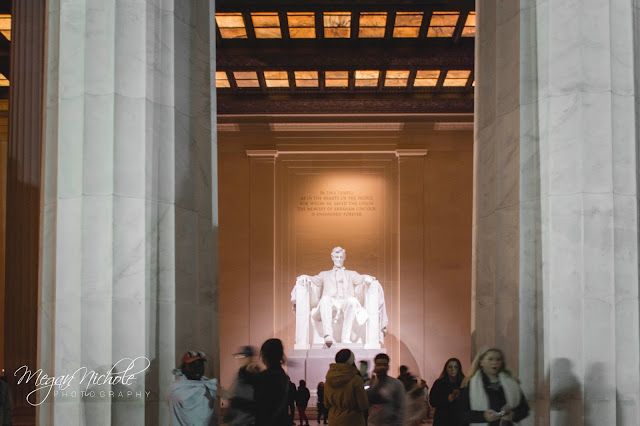A Washington D.C. Wanderer
11:37 AM
There is just something about walking around a big city at night only half-way knowing where you are going that raises a college student's confidence level and self-awareness.
This Christmas I had the opportunity to travel for nine days with the Harding University Department of Communications as well as students and professors from the business department, English department and fashion merchandising department.
Our first stop was Washington D.C., and, although this was not my first trip to the city, I experienced it in a completely different way than I had before. From getting to hear what it is like inside the White House from someone who worked there, to almost going on a drive while only halfway in the Uber car, to accidentally finding Ford's Theatre where Lincoln was shot you could say my experience was one of a kind.
During the day, and often in the rain, our entire group caught buses, taxis and Ubers to places like the national mall, Capital, White House, Newseum and National Archives.
The first night those of us who had arrived went to the national mall to see the monuments. Although the pictures turn out much easier during the day, the monuments and the experience of seeing them is so much more powerful at night. The Lincoln Memorial has always taken my breath away, and even after seeing it for the third time, the power of the monument did not dwindle. Each time I have visited I have found myself standing at the base of the stairs, or the base of a column or the feet of Lincoln simply staring and going back in time. The symbolism and proximity of the place where Martin Luther King Jr. stood to give his "I Have a Dream" speech, the words of Lincoln engraved along the walls, and the small details including the positioning of Lincoln's hands and body position speaks volumes. There is a reason it speaks so loudly; every finger, garment and placement was strategically planned for a reason. All of the monuments in the national mall carry these symbols and have amazing stories; each has a purpose and stands for details of history that no ordinary onlooker would notice, but when they are revealed, the meaning and significance of these memorials grows immensely.
{continued below}
Out next big activity was the Newseum, which was something I had never experienced before, and, as a journalism major (and not-so-secret-history buff), this was one of my absolutely favorite experiences in Washington D.C. I saw and touched portions of the Berlin Wall, saw front pages from the beginning of newspapers to current historical events, experienced the immense media coverage of September 11, 2001, saw the faces of journalists who had been killed doing their jobs all across the world, and cried in the Pulitzer Prize Photography exhibit.
As a photographer, walking through the Pulitzer Prize Photography exhibit was emotionally moving and probably one of the most memorable experiences throughout my time in Washington D.C. As I moved through the exhibit, I saw the selected photographs laid out by date in a semi-circle. As I browsed I not only saw history progress, but I caught glimpses into the lives of real, ordinary people. It inspired me and showed me the possibilities and power of holding a camera. Photographs can capture emotions, smells, and movements. I hope to one day create photography that will move people the way so many photographs in the exhibit moved me.
{continued below}
Another special thing about this trip was that we not only got to visit and tour the Capital, we were there on the day new congressmen were being sworn into office, creating a buzz of excitement and heavy concentration of congressman and their families in the hallways.
{continued below}
In addition to all we had already done, we also had the opportunity to explore the United States Botanical Garden, speak with a Harding alumnus from NPR and visit the new, ticketed entry, Museum of African American History. The lower portion of the museum was set up like a timeline; beginning at the bottom floor and working my way up, I walked through the history of slave trade, civil rights and pop culture to the exhibit about our nation's first African American president, Barack Obama.
Another thing that stood out to me over the course of my time in Washington D.C. is the nearly-lost art of handwriting and calligraphy. Yes, we see it as art and wall decor, but seeing beauty and elegance of documents like the Constitution, the Declaration of Independence, the Bill of Rights and the different amendments on display at the Museum of African American History made me wish that handwritten gestures were not so rare in today's society. In 200 years when people look at documents from today they will probably all be type and printed, but there is something about looking at a piece of paper that was hand written by our founding fathers (and their hired scribes) that makes the history a little more tangible.
There are many other memories, reflections and moments from my trip that I could share, but I know this has already gotten lengthy. To those of you who have made it this far down the page, thank you for investing in me. I write partly for myself and partly for someone else to read it, so thank you for allowing me to write and do what I love.
Be watching for my post about the second half of my trip in New York City coming soon!








































0 comments